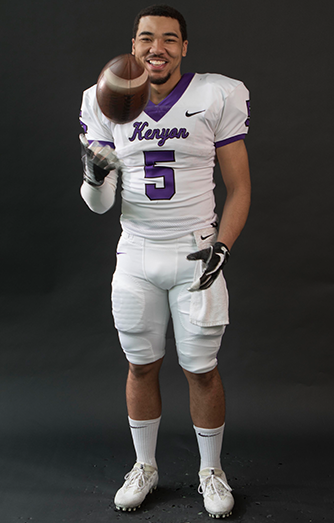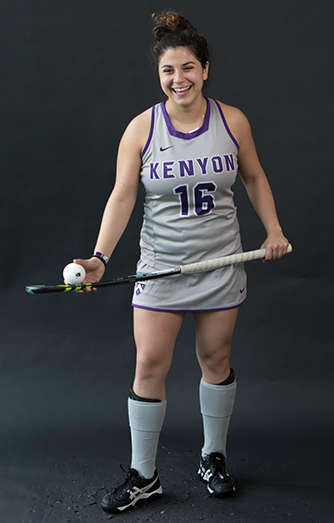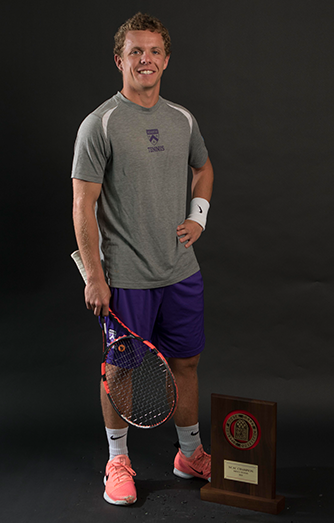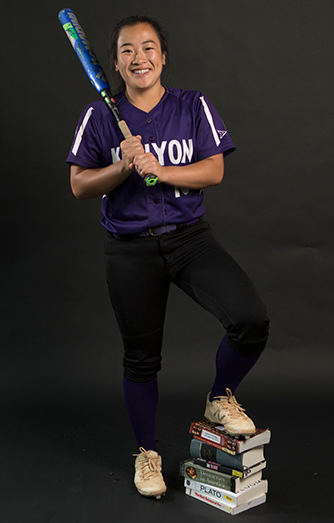In the Halls of Power
Political photojournalist Erin Schaff '11 tells the stories behind her headline-making images.
Read The StoryMeet stand-outs from the football, field hockey, tennis and softball teams.

For Brandon Byrd ’18, the one constant of his collegiate career was change. From changing positions on the football field to studying climate change in different environments, the versatile student-athlete from Cleveland, Ohio, learned to adapt while growing as a competitor and researcher.
Role Reversal
Byrd arrived at Kenyon as a quarterback, but quickly adjusted to a new position at his coach’s urging. He excelled for three seasons as a defensive back for the Lords and switched again his senior year to fill a team need as a receiver. The changes paid off: Byrd capped off his career with an impressive stack of statistics, as well a Scholar-Athlete Award from the National Football Foundation and College Hall of Fame.
Field Work
At Kenyon, Byrd’s environmental research took him to Peru, where he traveled on
a research grant from Professor Siobhan Fennessy, his mentor and a national expert on wetlands. While there, he climbed the Andes and extracted greenhouse gas samples from peat bogs to analyze the impact of wetlands on climate change. Closer to home, Byrd interned at Miami University of Ohio to study the effect of storms on lake metabolism — research that could have implications for lake conservation.
Natural Ability
Byrd’s love of nature started at an early age, when he would dig up worms in his backyard as a child growing up in Cleveland. His curiosity about the environment led him to pursue a degree in biology at Kenyon, where he conducted research to further the scientific community’s understanding of climate change. “I enjoy being outside and feeling like I'm a part of something bigger than myself.”
Building Community
Byrd became involved with the student organization Men of Color and tackled a leadership role as vice president, helping the group grow its membership fivefold. “We set up social activities and other events that prompted discussion,” said Byrd, who also volunteered with Relay for Life and Be The Match, a national bone marrow donor program.
Solving for Stress
Byrd finds outlets in drawing, listening to music and playing recreational basketball at the Kenyon Athletic Center. “I also have this weird thing where I just grab a Rubik’s Cube and solve it or create different patterns on it. I probably do it four or five times a week, just as a stress release. If I’m focused, I can solve it in about a minute and a half.”

Four-time all-conference field hockey player Kelsey Trulik ’18 held as many roles on campus as she did on the pitch. “Sports, sciences, diversity work, music, studying abroad, student engagement — you name it and I wanted to do it,” the neuroscience major said. The range she demonstrated at Kenyon was recognized with a competitive NCAA Postgraduate Scholarship as well as a job offer at Dana Farber Cancer Institute in Boston.
Team Player
Trulik never settled into one position on the field hockey roster. She started as an outside defender and, after just one game, was asked to shift to center back, a position she held for two seasons. When the team was in need of a scoring punch, Trulik took on more of an offensive role and wound up scoring five goals during her final two seasons.
Risk Rewarded
Her favorite moment playing for the Ladies was an unplanned one. In an NCAA Tournament game her junior year, the team was awarded a penalty corner in overtime and Trulik found herself out of position. “I could hear Coach screaming at me to get back on defense, but I looked at [teammate Katelyn Hutchinson ’18] and said, ‘Nope, we are going to do this.’” Hutchinson then fired a centering pass that Trulik steered over the goal line for the game-winner.
Path Less Taken
A native of Ann Arbor, Michigan, Trulik could have been the eighth person in her family to attend the University of Michigan. Instead, she chose Kenyon because she wanted to be exposed to new opportunities and perspectives. “Being part of a community that might think differently than the community you came from can spark really interesting conversations,” she said.
Conversation Starter
Embracing a trend across college campuses to help students define healthy masculinity, Trulik drove the creation of “masculinity meals” at Kenyon. “We wanted to create a space where students who identify as males could be open, honest and feel more engaged.” She tapped into her experience as a neuroscience major to research the issue — reading books, studying similar groups at other colleges and conducting focus groups — before implementing the program, which was recognized as a model at a statewide conference.
Learning in Action
Trulik took two classes her senior year that satisfied her passion for community-engaged learning. One class examined chemical interactions involving drugs like nicotine, alcohol and sugar. She and her classmates then molded their findings to design classroom activities and educational videos for a local middle school. A public health class gave Trulik the opportunity to work with the Knox County Health Department to better understand chronic health conditions in the area.

Born in Paris, France, to journalists who took him on their travels to Africa, Max Smith ’18 gained a global perspective that heavily influenced his studies. The tennis player and international studies and French double-major was drawn back to Africa twice during his Kenyon career — once for a study-abroad program in Cameroon and a second time for an internship in Guinea. After graduating with honors, he returned to Africa as a Fulbright Fellow to continue the research he started as a Kenyon student.
Lost in Translation
When Smith moved from France to the U.S., he struggled with the language and cultural transition. While navigating his new school, he eventually gravitated toward the tennis courts, where he met his high school coach, Michael Greenberg ’10, a Kenyon national singles champion who helped pave Smith’s way to Gambier.
Stepping Up
While Smith played a lot of tennis his sophomore season at Kenyon, he sometimes found it difficult to crack the lineup. So, he showed support in other ways — assisting in the organization of practices and fitness regimes, creating team rules and holding team meetings. He even helped coach two of his teammates who beat him out for spots at nationals.
Creating Buzz
Smith studied abroad in Cameroon, where he became fascinated by the country’s rapid growth of cellphone use. The number of service subscribers had more than tripled during the last 10 years, said Smith, adding, “The streets are literally buzzing with sounds of cellphones.” In his research, Smith met people using cellphones in innovative ways to improve their lives — from a security guard who made money charging phones at a remote cell tower he patrols to farmers using their phones check crop prices to ensure fair deals from buyers.
Research Rewarded
Returning to Africa to expand his research, Smith interned for Mobile Telephone Networks in Guinea. After compiling hundreds of surveys and conducting more than 50 interviews with people across Cameroon and Guinea, Smith wrote an honors thesis titled “The ‘Glocalization’ of Cellphones in West Africa.” His work earned him a Fulbright, which he is using to continue his research at the University of Lomé in Togo.
Racquet-Breaking Win
Smith’s most memorable moment on the court occurred during an NCAA Tournament match against No. 7-ranked Case Western. “We weren’t supposed to beat them,” he said. “It was the most emotion I’ve ever felt on the tennis court. I broke three racquets during the match, and [teammate Nicholas Paolucci ’19] gave me his racquet. He's a lot taller than me but I was in such a zone that the racquet size didn’t matter. I took it and finished the second set 6-0 for the win.”

Political science major Nicole Horita ’18 sought out campus leadership opportunities that placed her behind the plate, rather than in the center of attention. The starting catcher for the softball team interviewed prospective Kenyon students as an admissions fellow and increased awareness about LGBTQ issues as co-president of Athletes for Equality. “I discovered where I could and when I should take initiative, which was a big part of my experience at Kenyon,” said Horita, who is continuing her studies at the University of Pennsylvania Law School.
Field General
Horita was drawn to the catcher position at a young age, because she liked wearing all of the “cool” equipment. She soon began to take the position more seriously, honing her craft during her teenage years. “In my biased opinion, it’s the best position. I think it’s the equivalent of a quarterback in football. Whether you’re blocking, framing, calling pitches, throwing out would-be base stealers … every play you are doing something.”
Uniform Approach
What started as a habit turned into a sort of ritual for Horita, who would clear space on her desk and lay out her neatly folded uniform in exactly the same manner every night before a game. “It probably developed from trying to be prepared for early-morning tournament games, but now it signifies a kind of sacred respect for the game.”
Researching Remorse
Horita, from San Mateo, California, stayed on campus one summer to pursue research as a John Adams Summer Scholar in Socio-legal Studies. Alongside her faculty mentor, Professor Ric Sheffield, she researched the role of remorse in criminal sentencing, surveying Ohio judges on how much weight they gave to defendants’ claims of contrition. The results of her work laid the groundwork for a subsequent query of prosecutors and defense attorneys.
Puzzling Passion
Horita is hooked on The New York Times daily crossword. While trying to complete them over meals in Peirce Hall, her passion for the puzzle caught on with her teammates. However, they had to follow her rules — Mondays and Tuesdays, when the crossword is easier, were for individual work. “When it gets later in the week and the crossword gets tougher, then it's okay to collaborate.”
High Marks
Scoring in the 97 percentile on the LSAT — combined with the experience she gained at Kenyon — earned Horita acceptance into the University of Pennsylvania Law School. Ultimately, she wants to take on a job that facilitates agreements and compromise through contract-writing and negotiating. “I would enjoy being involved in those kind of processes. I don't want to be involved in litigation; the courtroom is not for me. I like to get the work done in the background.”
Political photojournalist Erin Schaff '11 tells the stories behind her headline-making images.
Read The StoryKenyon professors shed light on some questions that won’t leave us alone.
Read The StoryPhotographers document 24 uninterrupted hours of life on the Hill.
Read The StoryGo behind the music with Nick Petricca '09 of Walk the Moon, which launched at Kenyon.
Read The Story